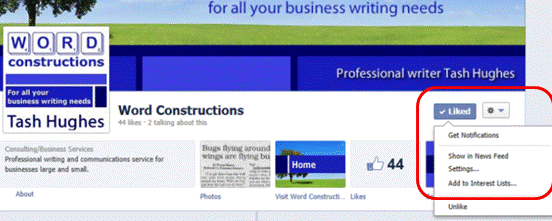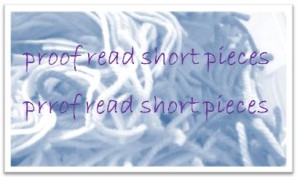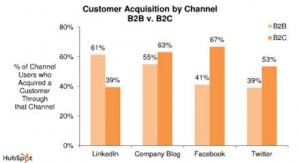I hope you find my writing and business tips and observations useful. My business and blog are dedicated to helping businesses communicate clearly and reach their potential.
Read, subscribe to my newsletter, enjoy!Tash
Facebook ads – short but important
Proof reading is important – even for short and (relatively) simple things like a Facebook ad.
A Facebook ad that needs proof reading
Unfortunately my screenshot didn’t work (and the ad hasn’t shown again since!) but I saw an ad this morning that seriously needed some help…
The heading of the ad was “New year. New hom.”
For a major company involved in real estate sales, you’d think home is an important word to get right.
I’d also have expected a company of that size to have a process of checking and approving ads before they go live – a one-person business is often at bigger risk of such errors because it is harder to correct your own writing.
The body of the ad included “but hurry – offer ends 28 February!”
Perhaps they meant hurry into your time machine?
That isn’t necessarily a proof reading error (unless they actually got the date wrong!) as it may be an incorrect setting on when the ad is to be run. Either way, attention to detail can have a big impact!
Proof reading matters…
We all do it – we write something and assume it is written exactly as we meant it to be.
But between typing mistakes (typos), thinking faster than we can type and actual spelling/grammatical errors, it is easy to have text that is not exactly what we wanted.
So we need to check our writing for errors. ALL our writing, whether short or long, whether technical, legally required or marketing, whether online or offline. It’s that simple!
And the key proof reading rules are to get someone else to check it and leave some time between the writing and proof reading.
Oh, and don’t rely on spell check to find all your errors, either. For example, in this post I typed ‘won’ instead of ‘own’ and a spell check would have accepted that as fine.[Tweet “Leave time between writing and proof reading, and don’t rely on spell check…”]

![]()

Is there business life beyond Facebook?
Like it or not, Facebook is a big site that attracts millions of people to it. Every day. Repeatedly.
As a business, it is important to understand how Facebook could be part of your marketing plan – note I don’t say you have to be ON Facebook but I do think it is a good idea to actively know about it and consciously decide whether or nor to use it for marketing.
Facebook is changing
If you’ve been on Facebook or read many marketing/SEO blogs, you’ll know that Facebook has changed things a number of times.
Recent changes, however, have made businesses wonder if Facebook will be a viable marketing option soon. Updates on business pages do not go into your fans’ news feed by default any more – some do, but fans have to show an interest first and it’s still no guarantee.
Facebook is moving towards charging businesses to be in front of fans.
As a business, it’s understandable that they want to make money. For SMBs, there is a real and justifiable fear that they won’t be able to compete in the advertising stakes against the big guys. A problem social media supposedly overcame for many SMBs.
At least they have now added notifications so fans can choose to be notified of updates on a page.
What other options are there?
I don’t see this as a small answer. I never thought of Facebook as that important my business relies on it so I already use a number of other avenues.
But some businesses have put a lot into their Facebook page and could be challenged by looking elsewhere.
The appeal of Facebook is that so many people use it. But how many of those people are really your target market anyway? A targetted option may have fewer users but more of them will be interested so it could offer much more value anyway.
To me, the risk of Facebook (and similar sites) is lack of ownership. You don’t ‘own’ your Facebook profile in the same way you own your website. Facebook can change the rules or disappear, leaving you without all you built up.
One way to keep using Facebook but have less reliance on it is to add ‘like’ buttons to your site.
That means people can still refer to you and your site to their Facebook friends but traffic comes to your site, not your Facebook profile.
Chris Syme offers a number of good ideas in a recent blog post and I’d add a few more:
- get involved on some popular blogs – leave comments and interact with the blogger and other readers
- do some guest blogging
- find some forums that suit your niche and become active there – it’s a smaller audience but targetted
- if using any social media, keep a focus on your website so you don’t lose everything if the platform collapses or becomes unusable
- develop and maintain an email list
- promote yourself offline as well – ads in local newsletters, sponsor local events and hand out business cards appropriately
What would happen to your business tomorrow if Facebook suddenly wanted to charge too much for your page?
Do you have other viable options already in place?





Recent Comments